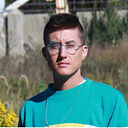Not So Sick.
The appointment was in a cancer and hematology ward. Just the word “cancer” on the sign made me feel like my problem was more serious, made the conditions I’d been tested for seem more pressing and real.
Before they’d just seemed like an excuse to bleed me of money, time, and, well, actual blood — it could be rheumatoid arthritis, it could be lupus, it could be sprue, you may have to give a bone marrow sample, please lie down and put the towel over your chest, please step into the x-ray, etc. But I knew I wasn’t really sick-sick. I knew it. So I resented having to give all these little slices and drips of myself up.
In the waiting room, an elderly-ish brother and sister were interviewing the head of a home nursing service. I stared out the windows at the layers of trees in Lincoln Park (the waiting room was a round bubble sitting on the edge of the hospital) and listened to them; I figured out they were looking for a caregiver for their elderly father.
“What are the uh, races or uh, ethnicities of your care givers?” The sister asked.
The caregiver, who was Asian and wearing a very conservative black suit said, “Oh, well we have Jamaican, we have Korean, we have some…some African American. Now, would you want for your father a female caregiver, a male, no preference..?”
“I think a female,” the man said. He turned to his sister. “I think, he’s always liked women. He’s always liked to be around women.”
“Can they drive?” the sister asked. “I think it would be best if they could go pick up a ton of groceries for Dad about once a week or so…”
“We can get an aide that drives,” the Asian woman said. “It’s just, most of the women, they do not drive. So getting a woman who can also drive…that may be difficult.”
“What are the races of the caregivers, again?” The sister asked.
I couldn’t believe she was asking that again. I watched the Asian woman list the races again, very calmly, no judgment; the brother and sister sat with thoughtful expressions wound into their faces. I wanted to hear more, but then I was called into the doctor’s office.
I went through the motions with the doctor and his cadre of resident MDs, four young beautiful people about my age. The way he lectured them but expected them to know everything already reminded me of how my PhD adviser treats me now that I have graduated. You never can see your mentee as a full equal, more like an near-adult child who is still growing while you are not.
He made them all examine my eyes and question me. They stood around in a half-moon around the table while the doctor listened for my heart murmur and pulled my breasts out of the bra I’d left on under the gown; he noted, and made them note, how they were the shape and density you’d expect for a premenopausal woman my age. Bumpiness was a word that came up.
After, we all sat in the doctor’s private office between his books and faded drawings from his now-grown children. We talked about my condition nearly like equals. I understood the terminology and he gave me plenty of background information. It was interesting. When I departed he said have a nice day, you’re probably the healthiest person we’ll see all week.
Before I left there were blood draws. Eight or ten tubes thick in the nurse’s fist like a clutch of sunflower stems — I yelped at her “That many?! I’m going to pass out.” And she left and brought me juice but I still winced through the whole thing, clutching my scarf to my face and breathing heavily; she just pulled up an armrest and said here, your head will fall on that cushion if you pass out. Nonchalant.
I looked at the hallway and puffed air out and felt the blood seep out of me. It’s cruel but necessary that a doctor can look at you one minute and say, “Your blood, where is all your blood? The count is too low.” and then demand vial after vial of it the next. The way to figure out anemia is to drain more blood. I nearly ran out of the office before they could do it to me again. Sneaking out would have been easy.
I can’t handle blood coming out of the body. I like gore, I like horror, but blood draws and pulsing, gushing wrist wounds and tubes filling with blood makes my polarity flip. I looked away and murmured some nonsense about how my boyfriend used to sell plasma and how unimaginable that was, all his blood drained and filtered through a hanging bucket beside his head and pushed back in.
“But most of your patients must be used to blood draws,” I said to the nurse, suddenly self-conscious. Cancer ward. Blood disorders. I was the healthiest one on the ward all week.
“Yeah,” she said. “You get to the point where you will do anything to feel better.”
And then the blood was done, all gathered in her hands. Sometimes, when the anemia is bad, losing even two vials can make me dizzy and pale, tired for the rest of the day. A few weeks ago, I gave four vials and the nurse had to fan me with a manila envelope and I told her I was okay, but I wasn’t; I sat on the curb outside the building for ten minutes, and shuffled home to be horizontal the whole rest of the day.
But this time I felt fine.
Originally published at erikadprice.tumblr.com.
